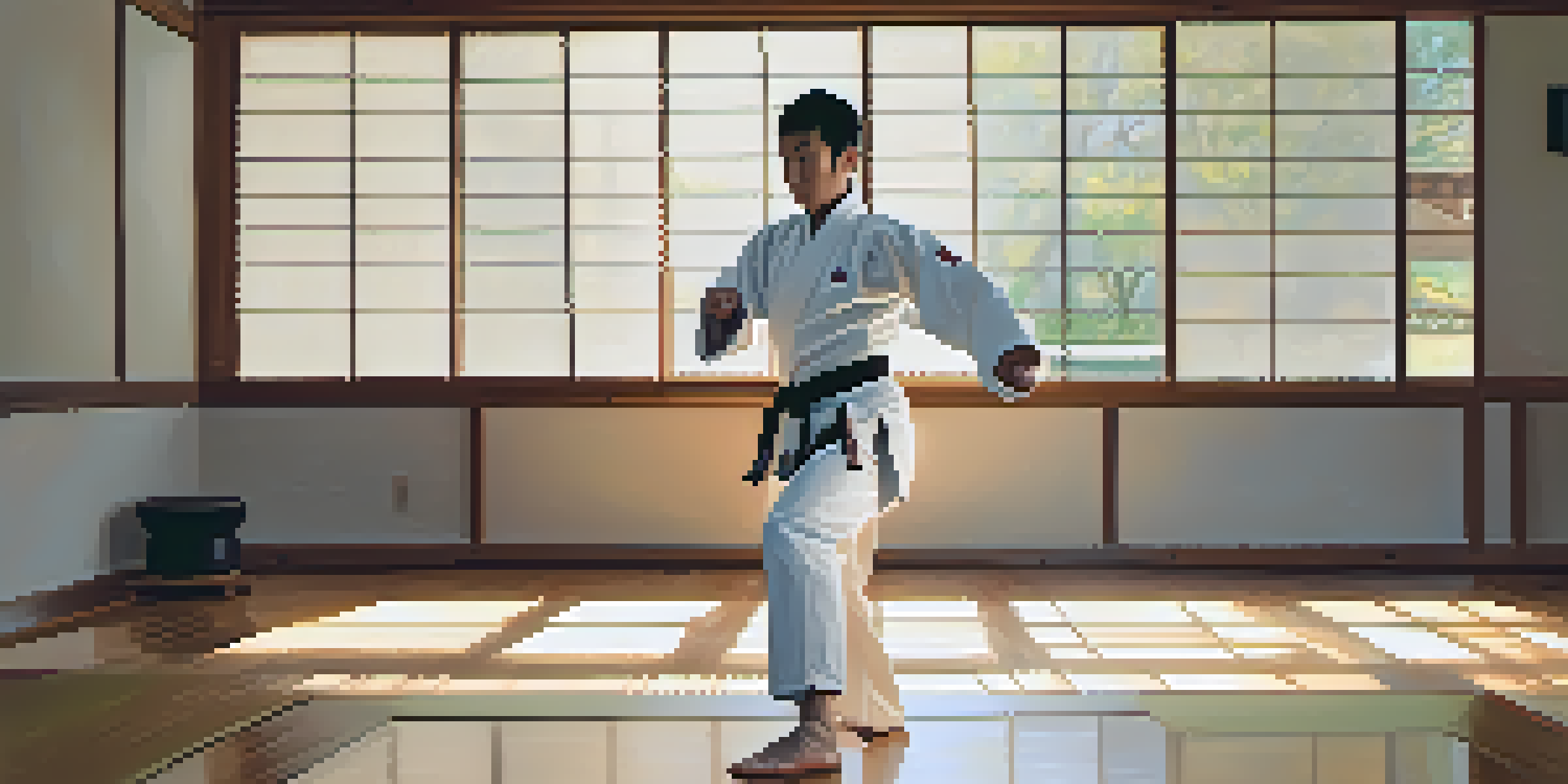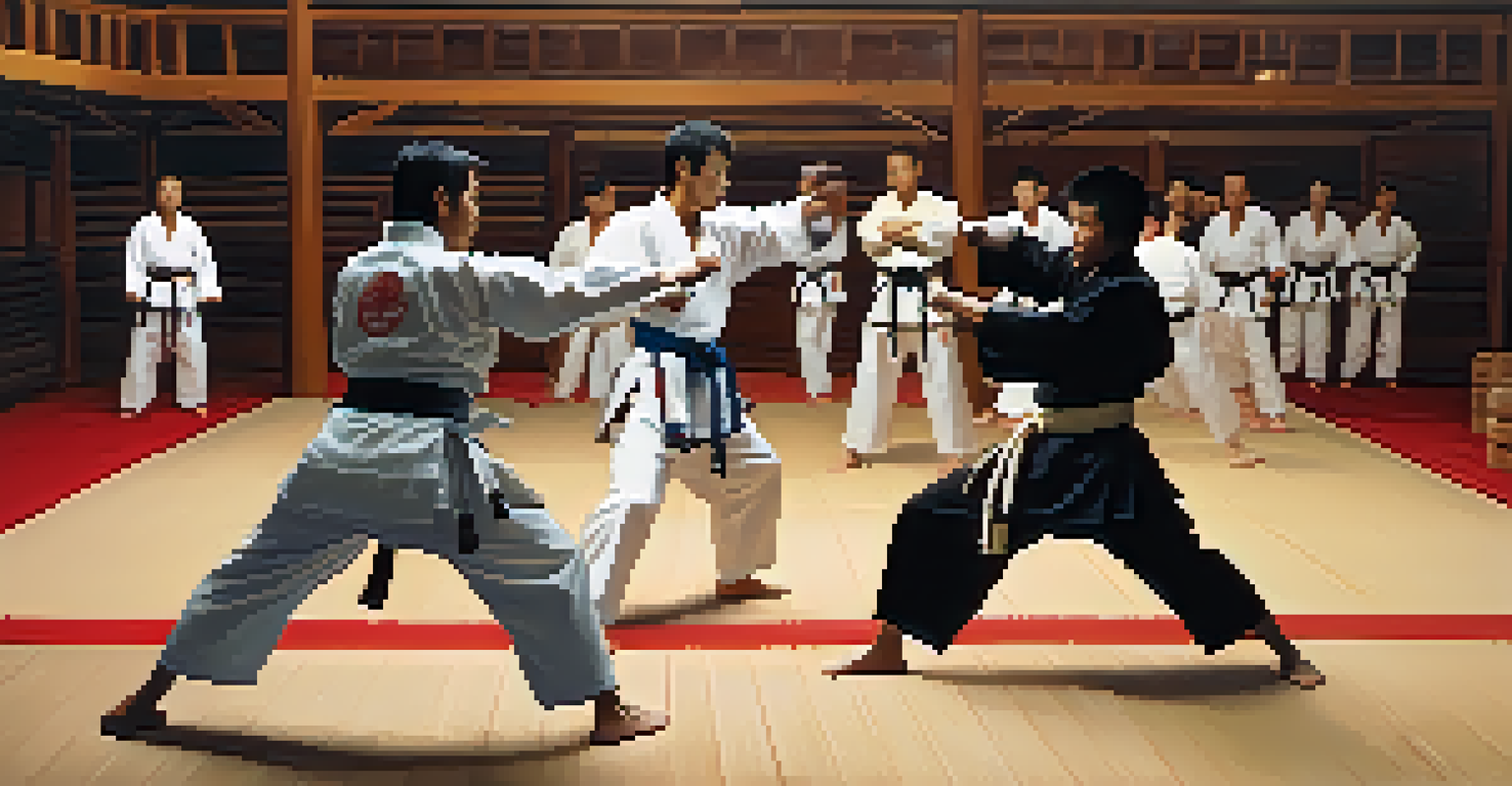Mental Fortitude: Martial Arts Enhance Emotional Resilience

Understanding Mental Fortitude in Martial Arts
Mental fortitude refers to the ability to withstand stress and bounce back from challenges. In the context of martial arts, this concept is pivotal as practitioners often face physical and emotional trials. When you step onto the mat, you're not just training your body; you’re also engaging your mind in a dance of discipline and focus.
Courage isn't having the strength to go on; it's going on when you don't have strength.
Martial arts training requires participants to push past their comfort zones, which in turn builds confidence and resilience. For instance, consider the moment when a beginner learns to fall safely during judo practice. That initial fear transforms into a sense of control and empowerment, illustrating the core of mental fortitude.
Ultimately, understanding mental fortitude in martial arts sets the stage for deeper emotional growth. As practitioners learn to manage their fears and anxieties, they cultivate a mindset that empowers them in other life areas.
Discipline: The Foundation of Emotional Resilience
Discipline is a cornerstone of martial arts training and an essential component of emotional resilience. It teaches individuals the importance of consistency and commitment, which are crucial when facing life's challenges. When students commit to regular training, they learn to prioritize their goals, making it easier to weather emotional storms.

For example, a martial artist who practices daily is not just honing their physical skills; they are also reinforcing their ability to stay focused amidst distractions and setbacks. This discipline translates into other aspects of life, allowing individuals to face difficult situations with a more resilient mindset.
Mental Fortitude Fuels Growth
Mental fortitude in martial arts helps practitioners manage challenges, fostering resilience and emotional growth.
In essence, the discipline developed through martial arts cultivates a strong mental framework, equipping practitioners to handle emotional upheavals with grace and determination.
Emotional Control: A Key Benefit of Training
One of the most valuable lessons learned in martial arts is emotional control. Training often involves sparring, where participants must manage their emotions under pressure. This experience teaches practitioners how to channel adrenaline and anxiety into focused action, fostering a sense of calm amidst chaos.
In the middle of difficulty lies opportunity.
Imagine a fighter in the heat of competition, feeling the pressure to perform. The ability to remain composed during intense moments is a direct result of consistent training, which helps cultivate emotional stability. This skill is not only crucial in martial arts but also beneficial in everyday life.
Thus, emotional control gained from martial arts practice empowers individuals to navigate stress and anxiety more effectively, enhancing their overall emotional resilience.
Facing Fear: Building Courage Through Challenges
Martial arts training is often about confronting fears, whether it’s the fear of getting hit or the fear of failure. Each challenge faced on the mat serves as an opportunity to build courage and resilience. When practitioners learn to face their fears head-on, they develop a sense of bravery that extends beyond the dojo.
Take the example of a student preparing for their first belt test. The anxiety of performing in front of peers can be daunting. However, through preparation and practice, that student learns to confront their fears, emerging stronger and more confident.
Discipline Builds Emotional Strength
The discipline learned through martial arts training equips individuals to tackle life's adversities with greater resilience.
In this way, martial arts act as a training ground for resilience, teaching individuals not only to face their fears but to embrace them as part of their growth journey.
Community Support: Strengthening Emotional Bonds
The martial arts community plays a significant role in fostering emotional resilience among practitioners. Training alongside others creates a support system that encourages growth and camaraderie. This sense of belonging can be incredibly powerful, especially in moments of personal struggle.
For instance, sparring with a partner not only helps improve skills but also builds trust and friendship. These relationships create a safe space for individuals to express their challenges and seek support, reinforcing the idea that they are not alone in their journey.
As a result, the strong bonds formed within martial arts communities contribute to emotional resilience, providing a network that encourages individuals to persevere through life's ups and downs.
Mindfulness and Focus: Keys to Resilience
Martial arts often incorporate mindfulness techniques, which enhance emotional resilience by promoting mental clarity and focus. Practitioners learn to be present in the moment, which is a powerful tool for managing stress and anxiety. This focus enables individuals to respond to challenges with a clear mind rather than being overwhelmed by emotions.
For example, during a kata (a pre-arranged sequence of movements), martial artists must concentrate fully on their techniques, blocking out distractions. This focus not only improves their performance but also reinforces a mindset of being present, which can be applied in everyday situations.
Community Enhances Emotional Resilience
The supportive environment of martial arts communities fosters strong emotional bonds, helping individuals navigate personal struggles.
Ultimately, the mindfulness cultivated through martial arts training equips individuals with the skills to face life's challenges with a calm and resilient attitude.
The Long-Term Benefits of Martial Arts on Resilience
The benefits of martial arts extend far beyond the training floor, impacting participants' lives in profound ways. Over time, the skills learned in martial arts translate into enhanced emotional resilience that can help individuals navigate personal challenges more effectively. Whether it's dealing with stress at work or managing relationships, the lessons learned on the mat are valuable.
Consider a martial artist who has trained for years; they are likely more equipped to handle setbacks, adapt to change, and maintain a positive outlook. The experiences faced during training, including overcoming obstacles and learning from failure, prepare them for life's unpredictability.

In summary, the long-term benefits of martial arts training foster a resilient mindset that empowers individuals to lead fulfilling lives, making them more capable of handling emotional challenges.